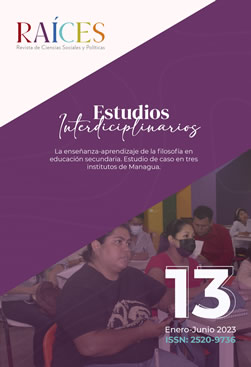The teaching-learning of philosophy in secondary education.
Case study in three Institutes of Managua
DOI:
https://doi.org/10.5377/raices.v7i13.16961Keywords:
Education, philosophy, life historyAbstract
The present research was carried out in three Secondary Schools in Managua, with the objective of knowing the experience of three teachers who taught the subject Philosophy in the period 2010-2020, to carry out the study, the research team used the life history as a research technique. The study is based on the interpretive paradigm, Oral History as a research method and the qualitative approach. This subject has been taken, since experience says that some students do not give much importance to the study of this subject, so it was identified what strategies are being implemented and assessed whether others should be incorporated. Through this research, it was possible to identify that the teaching-learning of the subject Philosophy in Secondary Education, has reached great achievements, for this, teachers apply different teaching-learning strategies, such as logs, exhibitions, debates, questionnaires, among others, making use of different didactic resources, which allow the development of the contents with greater dynamism for students, making them the architects of their learning and achieving a broad vision of this subject and reaching a significant understanding of the contents developed in this subject.
Downloads
References
Álvarez-Gayou Jurgenson, J.L. (2003). Cómo hacer investigación cualitativa. Fundamentos y metodología. http://mayestra.files.wordpress.com/2013/03/bibliografc3ada-de-refe-rencia-investigacic3b3n-cualitativa-juan-luis-alvarez-gayou-jurgenson.pdf
Arbazua Victoriano, F. (2017). Historia oral en primera, tercera persona. Historia Actual Online, (44), 3, 149-156. https://www.historia-actual.org/Publicaciones/index.php/hao/article/view/1334
Bacerra González, F. (2016). Historia oral e investigación escolar para la construcción de subjetividad en el aula. Trabajo de Licenciatura. https://repository.udistrital.edu.co/handle/11349/3831
Cortes, P. (2011). El sentido de las historias de vida en investigaciones socioeducativas. Historia de vida en educación. Biografías en contexto. https://dialnet.unirioja.es/servlet/articulo?codigo=7515256
Chourio López, D. (enero-abril, 2013). Historia oral y su utilidad en la enseñanza de la Historia. Consejo Latinoamericano de Ciencias Sociales CLACSO. http://biblioteca.clacso.edu.ar/Venezuela/ceshc-unermb/20170218101541/RPS101.pdf
Goodson, F. (septiembre- diciembre, 2003). Hacia el desarrollo de las historias personales y profesionales de los docentes. Revista Mexicana de Investigación Educativa. (8), 19, 733-758. https://www.redalyc.org/pdf/140/14001908.pdf
Lara P. y Antunes, A. (enero-diciembre,2014). La Historia oral. Como alternativas metodológicas para las Ciencias Sociales. Revista de Teoría y Didáctica de las Ciencias Sociales, (20), 45-56. https://www.redalyc.org/pdf/652/65247751003.pdf
Martínez Godínez, V.L. (2013). Paradigma de investigación. Manual Multimedia para Trabajos de Investigación, una visión desde la visión la epistemología dialéctica crítica. https://pics.unison.mx/wp-content/uploads/2013/10/7_Paradigmas_de_investigacion_2013.pdf
Merino, C. (1995). Metodología cualitativa de la investigación psicosocial. UNAM-CISE, España.
Orozco Alvarado, J.C. y Díaz, Pérez, A. A. (2019). Memoria histórica del colegio público de Esquipulas de Managua. Un proyecto de emprendimiento comunitario. Revista electrónica de conocimientos, saberes y prácticas. DOI: https.//doi.org/10.5377/
Rodríguez, Luque y Navas (2014). Usos y Beneficios de la Historia Oral. (3), 193-200. https://digibug.ugr.es/bitstream/handle/10481/32326/ReiDoCrea3A24.pdf?sequence=6&i-sAllowed=y
Zapata, D. Calero, T. y Herrera, C. (2019). Historia de vida una docente de Geografía. Experiencia de tres graduados de la carrera de Ciencias Sociales de la facultad de Educación e Idiomas, UNAN. Managua. Trabajo de Licenciatura.

Downloads
Published
How to Cite
Issue
Section
License
Copyright (c) 2023 Universidad Nacional Autónoma de Nicaragua. UNAN-Managua, Nicaragua.

This work is licensed under a Creative Commons Attribution-NonCommercial-ShareAlike 4.0 International License.



